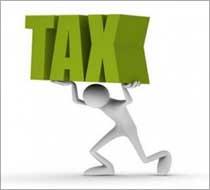The tax season is here. And if you are an employee you can't blame your employer for deducting large chunks of money from your salary towards TDS or tax deducted at source, which he is legally obliged to do. Also, your bank will deduct some percentage from your fixed deposit interest of Rs 10,000 or more towards TDS. So what is this TDS all about? How is it computed? Are there any changes this year? Read on...
 What is TDS?
What is TDS?
TDS is one of the many ways to collect tax. Actually TDS reduces one's taxable income and could even provide tax relief. The TDS collections account for 40 per cent of the total taxes collected in the country. As the name suggests TDS is the amount of tax that is deducted at source in certain types of income. The TDS thus collected is deposited in the government treasury within a specified time.
How is it computed?
Some of the types of income where TDS is applicable include salary, interest, rental fee, interest on securities, insurance commission, dividends from shares and UTI/mutual funds, commission and brokerage, prize money won from lotteries, horse races, etc, payments to non-resident sportsmen or sports associations, commission on sale of lottery tickets, fees for professional and technical services and the like, compensation for compulsory acquisition, income from units of an offshore fund and income from foreign currency bonds or shares of Indian Companies (unless specified as tax-free) and others.
The process of calculating the TDS involves these steps:
- Estimate the gross salary paid to the employee for the whole year;
- Find out and estimate the exemptions if any from the total salary income;
- Add other income of the employee as disclosed by him like rental income, capital gains etc.
- Consult employee to calculate deductions, if any, from the salary income;
- Arrive at the employee's net income and calculating the tax on the same;
- Deduct the tax equally over 12 months of the year;
- Pay the TDS every month and file e-TDS return every quarter; and finally
- Ensure the employee is issued with Form 16 (TDS certificate).
How does it benefit salaried people?
Basically the TDS process saves the employee the time and the hassles of going through the cumbersome procedures involved in filing separate tax papers. On the salary part which is made up of many components, some monthly and some yearly there is income tax applicability in each component.
|
Salary components |
Explanation |
Taxability status |
|
Basic |
Many deductions are based on this component including your PF and your employer's PF contributions. Core part of monthly salary. |
Taxable |
|
Dearness Allowance |
Paid out monthly to offset the increase in cost of living due to inflation. |
Taxable |
|
Incentive/Bonus |
Monthly or yearly depending on the company. Usually paid out to encourage the employees. |
Taxable |
|
Conveyance allowance |
Paid every month to meet expenses related to commuting to office. |
Up to Rs.800 per month or Rs.9,600 in a year is exempt from tax. |
|
HRA |
House rent allowance is a percentage of your basic and paid monthly. |
Tax free subject to certain conditions. |
|
Medical allowance |
Monthly or yearly pay out to meet medical expenses |
Fully taxable; however reimbursement upon submission of bills up to Rs. 15,000 per year is tax free. |
|
LTA/LTC |
Leave travel allowance/concession is paid once a year to meet traveling expenses for you and your family. |
Tax free subject to certain conditions. |
|
Vehicle/telephone/special allowance |
Paid out monthly to maintain your vehicle/telephone/and any other expenses not covered under the above heads. |
Taxable |
What are the possible deductions for tax under TDS?
The possible deductions on the employee's gross salary after exemptions are taken into account come under Section 16 of the IT Act. These include dues paid as professional tax, deductions for investing in various tax saving investments like PPF, life insurance premium, pension schemes by life insurers, Mediclaim premium, interest on loans for education, house rent paid and deductions under Section 80U.
Are there any changes this year?
In the last budget in 2009, the Government had abolished levying the employer for the fringe benefit tax or simply FBT and instead put it on the hands of the employees. There are some changes regarding FBTs for instance on housing and ESOP or employee stock option perquisites. With this change the companies would now have to take into consideration the value of perquisites in calculating the taxable income of their employees.
This year the Income Tax Department in the country will take a special interest on tax deducted at source or simply TDS. Well, the intention is to turn in maximum collections from this segment this fiscal year! From the taxpayer's perspective starting next fiscal you might shell out more tax if you do not quote the Permanent Account Number in transactions subject to TDS.









 © 2025
© 2025